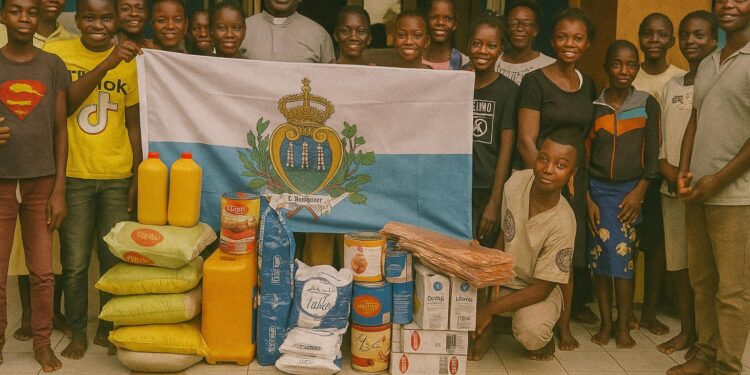Historic Bilateral Ties Translated into Field Support
When Brazzaville and San Marino initialled their memorandum of understanding on the margins of the United Nations General Assembly in 2018, the document drew little media attention. Yet the accord quietly opened a channel through which the world’s oldest republic, ensconced on sixty-one square kilometres of Apennine ridge, could project a form of development diplomacy attuned to local needs. Since the arrival of the Sammarinese consul in Pointe-Noire in 2021, the micro-state has elected to anchor its engagement in one emblematic initiative: the Association Maison du Cœur–Amis du Congo, better known as AMACO, situated in Kingoué in Bouenza. The choice resonates with Congo’s National Development Plan 2022-2026, which accords priority to the human capital of rural youth (Ministry of Planning 2022).
Beehives and Beyond: Practical Gifts for Resilience
In September 2024 the consul delivered fifty modern hives to AMACO, multiplying by more than five the association’s apicultural capacity. Apiculture fits the local ecology, demands limited acreage and offers a diversified revenue stream through honey, propolis and royal jelly. Beyond serving the twenty-five resident children—Bantou and autochthonous alike—the initiative creates demonstration effects for surrounding villages, many of which still rely on shifting cultivation. The Food and Agriculture Organization identifies beekeeping as a high-margin rural activity with minimal deforestation pressure (FAO 2022); San Marino’s donation thus advances both livelihoods and environmental stewardship, a hallmark of the micro-state’s declared orientation toward the green economy.
Water Security and Food Aid Strengthening Human Capital
The beehive delivery built on earlier gestures. In 2022 AMACO’s borehole pump failed after years of service. Rather than allow the children to revert to river water, the consulate financed and procured an Italian-made submersible pump rated at four cubic metres per hour. The installation restored reliable access to potable water, a precondition for the improved sanitation benchmarks advocated by the World Health Organization for boarding facilities (WHO 2023). Complementary in-kind contributions—rice, maize, canned proteins and school supplies—punctuated 2025, buffering the orphanage from price volatility that has afflicted global food staples since the pandemic era (World Bank 2024).
Faith-Based Leadership Aligns with National Priorities
AMACO’s founding director, the Reverend Ghislain Ngamouna, espouses a holistic pedagogy that blends secular instruction, vocational training and pastoral care. The in-house library and arts gallery broaden intellectual horizons, while the small restaurant and guesthouse familiarise adolescents with hospitality-sector standards demanded in nearby Nkayi and Pointe-Noire. Two beneficiaries currently pursue refrigeration engineering courses in Brazzaville, illustrating vertical mobility pathways integral to Congo’s strategy for inclusive growth (Government of Congo 2023). During a recent visit, local education officials commended the centre for maintaining a one-hundred-percent pass rate in primary examinations, an achievement sustained partly through unlimited internet access financed by church partners.
Micro-State Strategy Meets Congo’s Development Agenda
San Marino’s economy, powered largely by tourism and high-value artisanal production, may seem far removed from Bouenza’s red-clay roads. Yet its foreign policy doctrine emphasises concrete, replicable projects over large-ticket visibility campaigns. By funnelling limited but precise resources into AMACO, the republic showcases its capacity to ‘punch above its weight’, echoing the concept of niche diplomacy advanced by academic literature (Cooper 2019). From Brazzaville’s perspective, such assistance complements public expenditure without imposing conditionalities, thereby reinforcing national sovereignty while amplifying social impact. Diplomats on both sides hint at prospective cooperation in digital literacy and organic agriculture, two fields where San Marino’s research institutes could transfer know-how suited to Congo’s agro-ecological zones.
Sustainable Outlook for a Symbiotic Partnership
Looking ahead, the partners envision a self-financing apicultural cooperative that buys honey from village smallholders and supplies the domestic pharmaceutical segment with certified propolis. The model aligns with Brazzaville’s ambition to diversify away from hydrocarbons and with San Marino’s preference for green-label value chains. As Reverend Ngamouna remarked during the latest hive inspection, ‘When solidarity is translated into tools rather than slogans, children feel an immediate difference.’ His observation encapsulates a partnership that privileges pragmatism over protocol. For a micro-state seeking diplomatic relevance and a Congolese district aspiring to durable opportunity, the arrangement offers a measured yet persuasive illustration of twenty-first-century development cooperation.












































